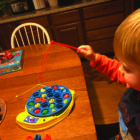
May 25, 2018
Rev. Nicholas J. Kersten
Director of Education and History
Earlier this year, my children acquired a new game—a “fishing” game. A rotating plastic pond is filled with plastic fish. Each fish has a hinged jaw that opens and closes as the pond holding the fish rotates around. The object of the game is simple: you use a simple plastic fishing rod to catch the plastic fish and remove them from the pond. Whoever catches the most fish wins. Though that seems simple enough, to young children the game can be difficult, as the fishes open their mouths to the hook at a seemingly variable rate, and there is some motor skill needed in hooking the fish.
We opened the game and I set to trying to explain the game to my two-year old son, Caedmon, and my four-year old daughter, Zoey. After clearing up some misunderstandings about the use of the fishing poles (“No, Caed, you can’t grab the bait end and shove it in the fish’s mouth…”) we started playing. Both kids had trouble catching the fish and started exploring ways of catching fish that broke the rules. As I tried to aid them, letting some of the less problematic violations slide, my son Caedmon did an interesting thing: he started fishing where the fish weren’t—from places where I had pulled a fish already as an example.
Apparently, because he wasn’t having success with the fishes’ mouths, he decided that shoving the hook into an empty hole was an easier and more desirable way to play the game. He went on for a full minute doing this, seemingly having a great time, before I asked him what he was doing. His decision came shortly after he had gotten tantalizingly close to catching a fish several times. His frustration with his near-misses led him to a place where he gave up attempting to play the game at all. When I pointed out to him what he was doing, instead of trying again, my son moved to the fish that had already been pulled from the pond, triumphantly hooking fish that were already out of the game!
I tell you this story from a thoroughly amusing night at home because I think there is a clear analog of this experience in our work as the body of Christ in our evangelism efforts. So many of us feel a burden for the lost and we want to get out and become “fishers of men”—but when we realize that not every cast of our figurative nets yields salvation for the lost and growth for the Kingdom—we too easily become discouraged and give up. Some of our giving up looks like fishing where lost people are not—in places where we are quietly confident we will not have to deal with the rejection that comes from our perceived failures in sharing our faith. Others of us refuse to leave the safe confines of our local congregations to share our faith, instead preferring to stick with those fish that Jesus has already caught!
If you are reading this and desire to increase your skill with your nets, there is good news! The best way to increase your skill in sharing your faith in Jesus Christ and witnessing to the work of God in your life is to get out and practice! Do not assume that just because the preliminary casts of your net do not yield Kingdom growth that they are wasted efforts! In addition, if you want to grow in skill, there are many resources you can use which will aid you in practicing your casts! May we never be content in fishing where the fish aren’t!


